Fleurs du Mal Magazine


Or see the index
Vandaag verschijnt het nieuwste deel in de reeks digitale publicaties van fleursdumal.nl, Fantom Ebooks. Fantom Ebooks nummer 2 is een werk van de Eindhovense dichter, schrijver en vertaler Paul Bezembinder, getiteld ‘Kwatrijnen. Filosofische Verkenningen’. De e-bundel omvat achttien filosofische en absurdistische kwatrijnen.
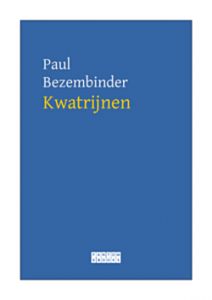 Bezembinder (1961) studeerde theoretische natuurkunde in Nijmegen. In zijn poëzie zoekt hij in vooral klassieke versvormen en thema’s naar de balans tussen serieuze poëzie, pastiche en smartlap. Zijn gedichten (Nederlands) en vertalingen (Russisch- Nederlands) verschenen in verschillende (online) literaire tijdschriften, waaronder fleursdumal.nl. Voorbeelden van zijn werk zijn ook te vinden op zijn website: www.paulbezembinder.nl
Bezembinder (1961) studeerde theoretische natuurkunde in Nijmegen. In zijn poëzie zoekt hij in vooral klassieke versvormen en thema’s naar de balans tussen serieuze poëzie, pastiche en smartlap. Zijn gedichten (Nederlands) en vertalingen (Russisch- Nederlands) verschenen in verschillende (online) literaire tijdschriften, waaronder fleursdumal.nl. Voorbeelden van zijn werk zijn ook te vinden op zijn website: www.paulbezembinder.nl
Fantom Ebooks is een uitgave van Art Brut Digital Editions en publiceert onregelmatig bijzondere kunst- en literatuurprojecten. Deel 3 verschijnt eind 2018. Fantom Ebooks nummer 1 is de bundel OVERVLOED van dichter Bert Bevers. Deze bevat tien verschillende vertalingen van het gedicht ‘Overvloed’ van Bert Bevers.
PAUL BEZEMBINDER
KWATRIJNEN
Filosofische Verkenningen
FANTOM EBOOKS
Art Brut Digital Editions
Series Fantom Ebooks
www.fleursdumal.nl
FANTOM 2
Fantom Ebooks 2018
ISBN: 978-90-76326-10-8
NUR 306
1ste PDF-uitgave FANTOM2, Juni 2018
GRATIS te downloaden via onderstaande LINK
fleursdumal.nl magazine
More in: - Book Lovers, - Book News, - Fantom Ebooks, Archive A-B, Art & Literature News, Bezembinder, Paul, PRESS & PUBLISHING
 Edgar Allan Poe
Edgar Allan Poe
The Cask of Amontillado
The thousand injuries of Fortunato I had borne as I best could, but when he ventured upon insult I vowed revenge. You, who so well know the nature of my soul, will not suppose, however, that gave utterance to a threat. At length I would be avenged; this was a point definitely, settled but the very definitiveness with which it was resolved precluded the idea of risk. I must not only punish but punish with impunity. A wrong is unredressed when retribution overtakes its redresser. It is equally unredressed when the avenger fails to make himself felt as such to him who has done the wrong.
It must be understood that neither by word nor deed had I given Fortunato cause to doubt my good will. I continued, as was my in to smile in his face, and he did not perceive that my to smile now was at the thought of his immolation.
He had a weak point this Fortunato although in other regards he was a man to be respected and even feared. He prided himself on his connoisseurship in wine. Few Italians have the true virtuoso spirit. For the most part their enthusiasm is adopted to suit the time and opportunity, to practise imposture upon the British and Austrian millionaires. In painting and gemmary, Fortunato, like his countrymen, was a quack, but in the matter of old wines he was sincere. In this respect I did not differ from him materially; I was skilful in the Italian vintages myself, and bought largely whenever I could.
It was about dusk, one evening during the supreme madness of the carnival season, that I encountered my friend. He accosted me with excessive warmth, for he had been drinking much. The man wore motley. He had on a tight-fitting parti-striped dress, and his head was surmounted by the conical cap and bells. I was so pleased to see him that I thought I should never have done wringing his hand.
I said to him “My dear Fortunato, you are luckily met. How remarkably well you are looking to-day. But I have received a pipe of what passes for Amontillado, and I have my doubts.”
“How?” said he. “Amontillado, A pipe? Impossible! And in the middle of the carnival!”
“I have my doubts,” I replied; “and I was silly enough to pay the full Amontillado price without consulting you in the matter. You were not to be found, and I was fearful of losing a bargain.”
“Amontillado!”
“I have my doubts.”
“Amontillado!”
“And I must satisfy them.”
“Amontillado!”
“As you are engaged, I am on my way to Luchresi. If any one has a critical turn it is he. He will tell me ”
“Luchresi cannot tell Amontillado from Sherry.”
“And yet some fools will have it that his taste is a match for your own.
“Come, let us go.”
“Whither?”
“To your vaults.”
“My friend, no; I will not impose upon your good nature. I perceive you have an engagement. Luchresi”
“I have no engagement; come.”
“My friend, no. It is not the engagement, but the severe cold with which I perceive you are afflicted. The vaults are insufferably damp. They are encrusted with nitre.”
“Let us go, nevertheless. The cold is merely nothing. Amontillado! You have been imposed upon. And as for Luchresi, he cannot distinguish Sherry from Amontillado.”
Thus speaking, Fortunato possessed himself of my arm; and putting on a mask of black silk and drawing a roquelaire closely about my person, I suffered him to hurry me to my palazzo.
There were no attendants at home; they had absconded to make merry in honour of the time. I had told them that I should not return until the morning, and had given them explicit orders not to stir from the house. These orders were sufficient, I well knew, to insure their immediate disappearance, one and all, as soon as my back was turned.
I took from their sconces two flambeaux, and giving one to Fortunato, bowed him through several suites of rooms to the archway that led into the vaults. I passed down a long and winding staircase, requesting him to be cautious as he followed. We came at length to the foot of the descent, and stood together upon the damp ground of the catacombs of the Montresors.
The gait of my friend was unsteady, and the bells upon his cap jingled as he strode.
“The pipe,” he said.
“It is farther on,” said I; “but observe the white web-work which gleams from these cavern walls.”
He turned towards me, and looked into my eves with two filmy orbs that distilled the rheum of intoxication.
“Nitre?” he asked, at length.
“Nitre,” I replied. “How long have you had that cough?”
“Ugh! ugh! ugh! ugh! ugh! ugh! ugh! ugh! ugh! ugh! ugh! ugh! ugh! ugh! ugh!”
My poor friend found it impossible to reply for many minutes.
“It is nothing,” he said, at last.
“Come,” I said, with decision, “we will go back; your health is precious. You are rich, respected, admired, beloved; you are happy, as once I was. You are a man to be missed. For me it is no matter. We will go back; you will be ill, and I cannot be responsible. Besides, there is Luchresi ”
“Enough,” he said; “the cough’s a mere nothing; it will not kill me. I shall not die of a cough.”
“True true,” I replied; “and, indeed, I had no intention of alarming you unnecessarily but you should use all proper caution. A draught of this Medoc will defend us from the damps.
Here I knocked off the neck of a bottle which I drew from a long row of its fellows that lay upon the mould.
“Drink,” I said, presenting him the wine.
He raised it to his lips with a leer. He paused and nodded to me familiarly, while his bells jingled.
“I drink,” he said, “to the buried that repose around us.”
“And I to your long life.”
He again took my arm, and we proceeded.
“These vaults,” he said, “are extensive.”
“The Montresors,” I replied, “were a great and numerous family.”
“I forget your arms.”
“A huge human foot d’or, in a field azure; the foot crushes a serpent rampant whose fangs are imbedded in the heel.”
“And the motto?”
“Nemo me impune lacessit.”
“Good!” he said.
The wine sparkled in his eyes and the bells jingled. My own fancy grew warm with the Medoc. We had passed through long walls of piled skeletons, with casks and puncheons intermingling, into the inmost recesses of the catacombs. I paused again, and this time I made bold to seize Fortunato by an arm above the elbow.
“The nitre!” I said; “see, it increases. It hangs like moss upon the vaults. We are below the river’s bed. The drops of moisture trickle among the bones. Come, we will go back ere it is too late. Your cough ”
“It is nothing,” he said; “let us go on. But first, another draught of the Medoc.” I broke and reached him a flagon of De Grave. He emptied it at a breath. His eyes flashed with a fierce light. He laughed and threw the bottle upwards with a gesticulation I did not understand. I looked at him in surprise. He repeated the movement a grotesque one.
“You do not comprehend?” he said.
“Not I,” I replied.
“Then you are not of the brotherhood.”
“How?”
“You are not of the masons.”
“Yes, yes,” I said; “yes, yes.”
“You? Impossible! A mason?”
“A mason,” I replied.
“A sign,” he said, “a sign.”
“It is this,” I answered, producing from beneath the
folds of my roquelaire a trowel.
“You jest,” he exclaimed, recoiling a few paces.
“But let us proceed to the Amontillado.”
“Be it so,” I said, replacing the tool beneath the cloak and again offering him my arm. He leaned upon it heavily. We continued our route in search of the Amontillado. We passed through a range of low arches, descended, passed on, and descending again, arrived at a deep crypt, in which the foulness of the air caused our flambeaux rather to glow than flame.
At the most remote end of the crypt there appeared another less spacious. Its walls had been lined with human remains, piled to the vault overhead, in the fashion of the great catacombs of Paris. Three sides of this interior crypt were still ornamented in this manner. From the fourth side the bones had been thrown down, and lay promiscuously upon the earth, forming at one point a mound of some size. Within the wall thus exposed by the displacing of the bones, we perceived a still interior crypt or recess, in depth about four feet, in width three, in height six or seven. It seemed to have been constructed for no especial use within itself, but formed merely the interval between two of the colossal supports of the roof of the catacombs, and was backed by one of their circumscribing walls of solid granite.
It was in vain that Fortunato, uplifting his dull torch, endeavoured to pry into the depth of the recess. Its termination the feeble light did not enable us to see.
“Proceed,” I said; “herein is the Amontillado. As for Luchresi ”
“He is an ignoramus,” interrupted my friend, as he stepped unsteadily forward, while I followed immediately at his heels. In niche, and finding an instant he had reached the extremity of the niche, and finding his progress arrested by the rock, stood stupidly bewildered. A moment more and I had fettered him to the granite. In its surface were two iron staples, distant from each other about two feet, horizontally. From one of these depended a short chain, from the other a padlock. Throwing the links about his waist, it was but the work of a few seconds to secure it. He was too much astounded to resist. Withdrawing the key I stepped back from the recess.
“Pass your hand,” I said, “over the wall; you cannot help feeling the nitre. Indeed, it is very damp. Once more let me implore you to return. No? Then I must positively leave you. But I must first render you all the little attentions in my power.”
“The Amontillado!” ejaculated my friend, not yet recovered from his astonishment.
“True,” I replied; “the Amontillado.”
As I said these words I busied myself among the pile of bones of which I have before spoken. Throwing them aside, I soon uncovered a quantity of building stone and mortar. With these materials and with the aid of my trowel, I began vigorously to wall up the entrance of the niche.
I had scarcely laid the first tier of the masonry when I discovered that the intoxication of Fortunato had in a great measure worn off. The earliest indication I had of this was a low moaning cry from the depth of the recess. It was not the cry of a drunken man. There was then a long and obstinate silence. I laid the second tier, and the third, and the fourth; and then I heard the furious vibrations of the chain. The noise lasted for several minutes, during which, that I might hearken to it with the more satisfaction, I ceased my labours and sat down upon the bones. When at last the clanking subsided, I resumed the trowel, and finished without interruption the fifth, the sixth, and the seventh tier. The wall was now nearly upon a level with my breast. I again paused, and holding the flambeaux over the mason-work, threw a few feeble rays upon the figure within.
A succession of loud and shrill screams, bursting suddenly from the throat of the chained form, seemed to thrust me violently back. For a brief moment I hesitated, I trembled. Unsheathing my rapier, I began to grope with it about the recess; but the thought of an instant reassured me. I placed my hand upon the solid fabric of the catacombs, and felt satisfied. I reapproached the wall; I replied to the yells of him who clamoured. I re-echoed, I aided, I surpassed them in volume and in strength.
I did this, and the clamourer grew still. It was now midnight, and my task was drawing to a close. I had completed the eighth, the ninth and the tenth tier. I had finished a portion of the last and the eleventh; there remained but a single stone to be fitted and plastered in. I struggled with its weight; I placed it partially in its destined position. But now there came from out the niche a low laugh that erected the hairs upon my head. It was succeeded by a sad voice, which I had difficulty in recognizing as that of the noble Fortunato.
The voice said–
“Ha! ha! ha! he! he! he! a very good joke, indeed an excellent jest. We will have many a rich laugh about it at the palazzo he! he! he! over our wine he! he! he!”
“The Amontillado!” I said.
“He! he! he! he! he! he! yes, the Amontillado. But is it not getting late? Will not they be awaiting us at the palazzo, the Lady Fortunato and the rest? Let us be gone.”
“Yes,” I said, “let us be gone.”
“For the love of God, Montresor!”
“Yes,” I said, “for the love of God!”
But to these words I hearkened in vain for a reply.
I grew impatient. I called aloud
“Fortunato!”
No answer. I called again
“Fortunato!”
No answer still. I thrust a torch through the remaining aperture and let it fall within. There came forth in return only a jingling of the bells. My heart grew sick; it was the dampness of the catacombs that made it so. I hastened to make an end of my labour. I forced the last stone into its position; I plastered it up. Against the new masonry I re-erected the old rampart of bones. For the half of a century no mortal has disturbed them.
In pace requiescat!
Edgar Allan Poe (1809 – 1849)
The Cask of Amontillado
fleursdumal.nl magazine
More in: Edgar Allan Poe, Poe, Edgar Allan, Poe, Edgar Allan, Tales of Mystery & Imagination

Growing Old
But now at thirty years my hair is grey—
(I wonder what it will be like at forty ?
I thought of a peruke the other day—)
My heart is not much greener ; and, in short, I
Have squandered my whole summer while ’twas May,
And feel no more the spirit to retort ; I
Have spent my life, both interest and principal,
And deem not, what I deemed, my soul invincible.
No more—no more—Oh ! never more on me
The freshness of the heart can fall like dew,
Which out of all the lovely things we see
Extracts emotions beautiful and new ;
Hived in our bosoms like the bag o’ the bee.
Think’st thou the honey with those objects grew ?
Alas ! ’twas not in them, but in thy power
To double even the sweetness of a flower.
No more—no more—Oh! never more my heart,
Canst thou be my sole world, my universe !
Once all in all, but now a thing apart,
Thou canst not be my blessing or my curse :
The illusion’s gone for ever, and thou art
Insensible, I trust, but none the worse,
And in thy stead I’ve got a deal of judgement,
Thou Heaven knows how it ever found a lodgement.
My days of love are over ; me no more
The charms of maid, wife, and still less of widow,
Can make the fool of which they made before,—
In short, I must not lead the life I did do ;
The credulous hope of mutual minds is o’er,
The copious use of claret is forbid too,
So for a good old-gentlemanly vice,
I think I must take up with avarice.
Ambition was my idol, which was broken
Before the shrines of Sorrow, and of Pleasure ;
And the two last have left me many a token
O’er which reflection may be made at leisure :
Now, like Friar Bacon’s Brazen Head, I’ve spoken,
‘Time is, Time was, Time’s past’ : a chymic treasure
Is glittering Youth, which I have spent betimes—
My heart in passion, and my head on rhymes.
What is the end of Fame ? ’tis but to fill
A certain portion of uncertain paper :
Some liken it to climbing up a hill,
Whose summit, like all hills, is lost in vapour ;
For this men write, speak, preach, and heroes kill,
And bards burn what they call their ‘midnight taper’,
To have, when the original is dust,
A name, a wretched picture and worse bust.
What are the hopes of man ? Old Egypt’s King
Cheops erected the first Pyramid
And largest, thinking it was just the thing
To keep his memory whole, and mummy hid ;
But somebody or other rummaging,
Burglariously broke his coffin’s lid :
Let not a monument give you or me hopes,
Since not a pinch of dust remains of Cheops.
But I, being fond of true philosophy,
Say very often to myself, ‘Alas!
All things that have been born were born to die,
And flesh (which Death mows down to hay) is grass ;
You’ve passed your youth not so unpleasantly,
And if you had it o’er again—’twould pass—
So thank your stars that matters are no worse,
And read your Bible, sir, and mind your purse.’
Lord Byron (1788-1824)
Growing Old
fleursdumal.nl magazine
More in: Archive A-B, Byron, Lord
De C. Buddingh’-prijs 2018 is toegekend aan Radna Fabias. De jury riep haar bundel ‘Habitus’ uit tot beste Nederlandstalige poëziedebuut van het jaar.
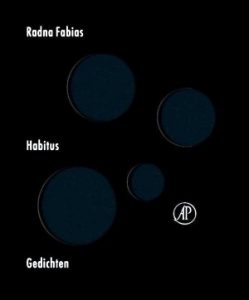 Met de woorden ‘Een wonderlijk ongeëvenaard geval, dat de jury vloeibaar maakt, morsend en gehoorzamend aan haar zwaartekracht,’ maakte juryvoorzitter Jeroen Dera de winnende bundel bekend tijdens ‘De staat van de poëzie’, een avond over de laatste ontwikkelingen in de Nederlandstalige poézie op het 49e Poetry International Festival.
Met de woorden ‘Een wonderlijk ongeëvenaard geval, dat de jury vloeibaar maakt, morsend en gehoorzamend aan haar zwaartekracht,’ maakte juryvoorzitter Jeroen Dera de winnende bundel bekend tijdens ‘De staat van de poëzie’, een avond over de laatste ontwikkelingen in de Nederlandstalige poézie op het 49e Poetry International Festival.
‘Er gebeurt iets in de Nederlandstalige poëzie’, aldus de jury, wat zeker ook te danken is aan de dichters Dean Bowen, Elisabeth Tonnard en Arno Van Vlierberghe die met hun bundels ‘Bokman’, ‘Voor het ideaal, lees de schaal’ en ‘Vloekschrift’ ook kans maakten op de dertigste editie van de debuutprijs. Naast Jeroen Dera zaten Charlotte Van den Broeck en Antoine de Kom in de jury.
Radna Fabias is geboren en getogen op de Nederlandse Antillen en studeerde aan de Hogeschool voor de Kunsten Utrecht.
“ik krijg
vijf trucs om gokkasten te laten betalen
een simpele manier om geld te maken
acht manieren om de man thuis te houden waaronder
vier brouwsels voor een strakkere kut”,
schrijft ze in ‘Habitus’. ‘Met overdonderde kracht sleurt ze de lezer mee in een broeierig tussengebied,’ aldus de jury. ‘Een subversieve stem die afkomst, bestemming, lichaam en perspectief te lijf gaat en daarbij zichzelf en de ander niet spaart, Deze poëzie is vlezig, goddelijk vunzig soms – en breekt de Hollandse dichtkunst weergaloos open, rekent af met het veilige vers. ‘Habitus’ zindert.
Het is moeilijk te zeggen wat het meest beklemt in deze bundel: het tropische eiland, het Nederlands waar de ik-figuur naartoe reist, of de categorieën die afkomst en bestemming projecteren op het lyrische ik. Fabias maakt deze beklemming voelbaar en tegelijkertijd gooit ze geijkte opposities als ‘wit’-‘zwart’, ‘man’-‘vrouw’, ‘ik’-‘ander’ open door ingenieus gebruik te maken van een cameramatige, maar uitgesproken lyrische stem die alle perspectieven opentrekt en het niet schuwt om zichzelf en de ander op het spel te zetten.’
Hoewel het aantal van 21 ingezonden debuten kwantitatief niet uitzonderlijk kan worden genoemd gaf de jury uiting aan het gevoel dat dit toch zeker een zeer bijzonder Buddingh’-jaar is.
‘Er gebeurt iets in de Nederlandstalige poëzie,’ zo meent de jury. In drieën valt op hoe op inhoudelijk vlak de combinatie van experiment en engagement overheerst, hoe de zoektocht naar een expliciet politiek ik centraal staat – een ik dat de verhouding zoekt tot de gemeenschap maar daarbij vooral de notie ‘gemeenschap’ problematiseert – en hoe de poëzie waarin dit allemaal gebeurt opvallend vaak verschijnt bij kleinere uitgeverijen.
De jury acht de kans groot dat het de uitgeverijen aan de rand van het literaire veld zijn die dit nieuwe geluid in de poëzie mogelijk maken.
Sinds 1988 wordt op initiatief van Poetry International ieder jaar de C. Buddingh’-Prijs uitgereikt aan de schrijver of schrijfster van het beste Nederlandstalige poëziedebuut. Met de prijs beoogt Poetry International meer aandacht te genereren voor talentvolle nieuwe stemmen in de Nederlandstalige poëzie.
Voor menig dichter van naam was de C. Buddingh’-Prijs de eerste belangrijke trofee die in de wacht werd gesleept. Joke van Leeuwen, Tonnus Oosterhoff, Ilja Leonard Pfeijffer en Anna Enquist, of recenter Lieke Marsman, Ellen Deckwitz, Maarten van der Graaff en Marieke Lucas Rijneveld behoren tot de laureaten.
Titel: Habitus
Auteur: Radna Fabias
Uitgever: de Arbeiderspers
Taal: Nederlands
ISBN10 9029523808
ISBN13 9789029523806
Februari 2018
Afmetingen 11x205x169 mm
Verschijningsdatum: 20-02-2018
Paperback
120 pagina’s
Prijs: € 19,99
NUR: 306
fleursdumal.nl magazine
More in: - Book News, Archive E-F, Art & Literature News, Awards & Prizes, Buddingh', Cees, Marsman, Lieke, Poetry International, Rijneveld, Marieke Lucas
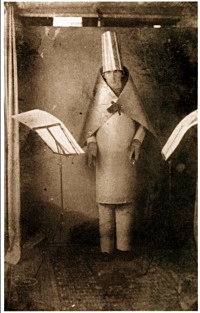
Bagatelle
Vor meinem Fenster,
Im Sonnenschein
Sitzen Engelein.
Eins, zwei, drei Engelein
Und äugeln herein.
Sie hauchen an die Scheiben
Und kichern sich an,
Und schreiben
Deinen Namen hin.
Und kichern sich an
Und verwischen ihn.
Und blinzeln gar boshaft
Und neckisch herein,
Und flattern fort
Die drei Engelein.
Hugo Ball
(1886-1927)
Bagatelle
fleursdumal.nl magazine
More in: Archive A-B, Ball, Hugo, Dada, DADA, Dadaïsme

Die Verlassene
An K. J.
Du irrst dich. Glaubst du, daß du fern bist
Und daß ich dürste und dich nicht mehr finden kann?
Ich fasse dich mit meinen Augen an,
Mit diesen Augen, deren jedes finster und ein Stern ist.
Ich zieh dich unter dieses Lid
Und schließ es zu und du bist ganz darinnen.
Wie willst du gehn aus meinen Sinnen,
Dem Jägergarn, dem nie ein Wild entflieht?
Du läßt mich nicht aus deiner Hand mehr fallen
Wie einen welken Strauß,
Der auf die Straße niederweht, vorm Haus
Zertreten und bestäubt von allen.
Ich hab dich liebgehabt. So lieb.
Ich habe so geweint … mit heißen Bitten …
Und liebe dich noch mehr, weil ich um dich gelitten,
Als deine Feder keinen Brief, mir keinen Brief mehr schrieb.
Ich nannte Freund und Herr und Leuchtturmwächter
Auf schmalem Inselstrich,
Den Gärtner meines Früchtegartens dich,
Und waren tausend weiser, keiner war gerechter.
Ich spürte kaum, daß mir der Hafen brach,
Der meine Jugend hielt – und kleine Sonnen,
Daß sie vertropft, in Sand verronnen.
Ich stand und sah dir nach.
Dein Durchgang blieb in meinen Tagen,
Wie Wohlgeruch in einem Kleide hängt,
Den es nicht kennt, nicht rechnet, nur empfängt,
Um immer ihn zu tragen.
Gertrud Kolmar
(1894-1943)
gedicht: Die Verlassene
fleursdumal.nl magazine
More in: Archive K-L, Archive K-L, Kolmar, Gertrud

In de doorslaap
Vriendelijk verwant zoals het werkwoord gapen
dat met slapen is liggen wij stilletjes hand in hand.
De hele nacht door sliep je lekker maar tegen
de ochtend werd je steeds weer van een piepje
wakker. Het leek of je keek naar de klei die ik kneed
alsof je weet dat het andere wolken zijn dan van donker:
in de doorslaap kerven zich de klamste dromen.
Bert Bevers
Gedicht: In de doorslaap
Uit Andere taal, Uitgeverij Litera Este, Borgerhout, 2010
Bert Bevers is a poet and writer who lives and works in Antwerp (Be)
fleursdumal.nl magazine
More in: Archive A-B, Archive A-B, Bevers, Bert
Drawing on draft manuscripts and other archival material, James Joyce and Absolute Music, explores Joyce’s deep engagement with musical structure, and his participation in the growing modernist discourse surrounding 19th-century musical forms.
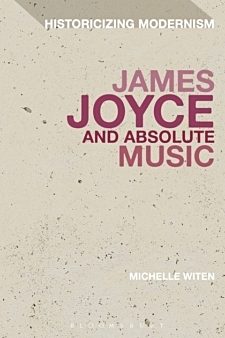 Michelle Witen examines Joyce’s claim of having structured the “Sirens” episode of his masterpiece, Ulysses, as a fuga per canonem, and his changing musical project from his early works, such as Dubliners and A Portrait of the Artist as a Young Man.
Michelle Witen examines Joyce’s claim of having structured the “Sirens” episode of his masterpiece, Ulysses, as a fuga per canonem, and his changing musical project from his early works, such as Dubliners and A Portrait of the Artist as a Young Man.
Informed by a deep understanding of music theory and history, the book goes on to consider the “pure music” of Joyce’s final work, Finnegans Wake.
Demonstrating the importance of music to Joyce, this ground-breaking study reveals new depths to this enduring body of work.
Towards a Modernist Condition of Absolute Music – Joyce’s Early Use of Music – Joyce’s fuga per canonem: A Case of Structure – Joyce’s fuga per canonem: A Case of Effect – Voided Fugue in “Circe” – “It’s Pure Music”: Finnegans Wake
Michelle Witen is Postdoctoral Teaching and Research Fellow at the University of Basel, Switzerland.
Michelle Witen
James Joyce and Absolute Music
Published: 22-02-2018
Format: Hardback
Edition: 1st
Extent: 320 p.
ISBN: 9781350014220
Imprint: Bloomsbury Academic
Series: Historicizing Modernism
Illustrations: 9 bw illus
Dimensions: 234 x 156 mm
RRP: £85.00
literature and music
fleursdumal.nl magazine
More in: # Music Archive, Archive I-J, Archive I-J, Art & Literature News, Joyce, James, Joyce, James
Henri Cole’s Orphic Paris combines autobiography, diary, essay, and poetry with photographs to create a new form of elegiac memoir. With Paris as a backdrop, Cole, an award-winning American poet, explores with fresh and penetrating insight the nature of friendship and family, poetry and solitude, the self and freedom.
 Cole writes of Paris, “For a time, I lived here, where the call of life is so strong. My soul was colored by it. Instead of worshiping a creator or man, I cared fully for myself, and felt no guilt and confessed nothing, and in this place I wrote, I was nourished, and I grew.”
Cole writes of Paris, “For a time, I lived here, where the call of life is so strong. My soul was colored by it. Instead of worshiping a creator or man, I cared fully for myself, and felt no guilt and confessed nothing, and in this place I wrote, I was nourished, and I grew.”
Written under the tutelary spirit of Orpheus—mystic, oracular, entrancing—Orphic Paris is an intimate Paris journal and a literary commonplace book that is a touching, original, brilliant account of the city and of the artists, writers, and luminaries, including Cole himself, who have been moved by it to create.
Henri Cole was born in Fukuoka, Japan, to a French mother and an American father. He has published nine collections of poetry, including Middle Earth, which was a finalist for the Pulitzer Prize. He has received many awards for his work, including the Jackson Prize, the Kingsley Tufts Award, the Rome Prize, the Berlin Prize, the Lenore Marshall Award, and the Medal in Poetry from the American Academy of Arts and Letters. His most recent collection of poetry is Nothing to Declare. He teaches at Claremont McKenna College and lives in Boston.
Orphic Paris
by Henri Cole
$15.95
Series: New York Review Books
ISBN: 9781681372181
Pages: 176
Publication: April 3, 2018
new books
fleursdumal.nl magazine
More in: - Book News, - Book Stories, Archive C-D, Archive C-D, Art & Literature News
‘Van de Ven is een opvallende verschijning in het peloton van wielerauteurs. Zijn forse postuur en woeste baard hebben hem de bijnaam Raspoetin bezorgd.
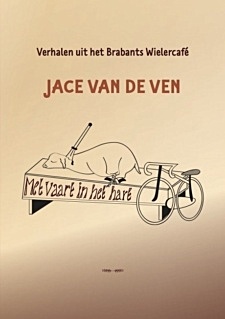 Verwacht geen geschoren benen, carbon frames en wetenschappelijk verantwoorde sportdrank,’ schreef het magazine for art en literature ‘Fleursdumal.nl’ over ‘Mag ik nog wat wind van achteren?’, de vorige bundel wielerverhalen van Jace van de Ven.
Verwacht geen geschoren benen, carbon frames en wetenschappelijk verantwoorde sportdrank,’ schreef het magazine for art en literature ‘Fleursdumal.nl’ over ‘Mag ik nog wat wind van achteren?’, de vorige bundel wielerverhalen van Jace van de Ven.
En Het is koers.nl noteerde: ‘Het zijn persoonlijke beslommeringen opgedaan tijdens vaak meerdaagse fietstochten, die bij mij de juiste snaar raken en uitnodigen om zelf te fietsen, te lachen, te genieten en na te denken.’
Ook Brabants Dagblad en Brabant Cultureel waren enthousiast. Buiten Noord-Brabant is de continue verwondering van Jace van de Ven, eerste stadsdichter van Tilburg, over coureurs en would-be-renners nog te onbekend. Jammer, want niemand schrijft zo hilarisch en tegelijk zo ontroerend over mensen op de fiets, of het nou sterren zijn of stumpers. Dat bewijzen de vijftien verhalen in ‘ Met vaart in het hart’ opnieuw.
Jace van de Ven is oud-redacteur van Brabants Dagblad en eerste stadsdichter van Tilburg. Als auteur van wielerverhalen wordt hij regelmatig uitgenodigd om zijn verhalen voor te lezen voor wielerverenigingen. De vele verzoeken om zijn teksten eens in boekvorm uit te brengen heeft hij nu gehonoreerd in deze handzame bundeling van zijn mooiste verhalen. Geschreven met wind mee…
JACE van de Ven
Met Vaart In Het Hart.
Verhalen uit het Brabants Wielercafé
Geïllustreerd door Ellis Pruijn
Jaar: 2018
Uitgever: Eigen beheer,
Categorie:
Gedicht / Poëzie / Proza
116 pagina’s:
Afmeting: 15×21 cm
Wielerboek
€ 14,00
# meer info sportmediashop
new books
fleursdumal.nl magazine
More in: - Book Lovers, - Book Stories, Archive U-V, Archive U-V, Art & Literature News, Ven, Jace van de
“My heart is bursting with homage as I / head off to a hostile eternity,” writes Jane Mayhall, eighty-five, who wrote most of these poems in an urgent outpouring over the last few years.
 From the decades-outdated subway token in the bottom of her shoulder bag, which calls forth earlier days in New York City, to the violin her father practiced among the pantry’s jam jars in her Kentucky childhood, Mayhall plucks small treasures that bespeak her fierce devotion to life, with its clutter of memories and imperfections. In her tightly knotted, beautifully turned short poems, she elegizes a world not quite gone, and brings us into contact with some of her contemporaries, from Lincoln Kirstein to Theodore Roethke.
From the decades-outdated subway token in the bottom of her shoulder bag, which calls forth earlier days in New York City, to the violin her father practiced among the pantry’s jam jars in her Kentucky childhood, Mayhall plucks small treasures that bespeak her fierce devotion to life, with its clutter of memories and imperfections. In her tightly knotted, beautifully turned short poems, she elegizes a world not quite gone, and brings us into contact with some of her contemporaries, from Lincoln Kirstein to Theodore Roethke.
Chief among her cherished memories is her long bohemian marriage, which she recalls in a series of ravishing love poems to her late husband. In lines saturated with feeling she describes how she accommodates her grief at losing him and, as throughout this exquisite volume, how we must continue to greet life, in all its gorgeous strangeness.
Jane Mayhall was born in Louisville, Kentucky, in 1918 and attended Black Mountain College in North Carolina. She taught at the New School for Social Research, Hofstra University, Morehead State University, and the Summer Writers’ Workshop at Hindman Settlement School in Kentucky. Her fiction and poems appeared in The Yale Review, The New Yorker, The Paris Review, and other publications. Mayhall lived in New York City until her death in 2009.
Sleeping Late on Judgment Day
Poems
By Jane Mayhall
Category: Poetry
Paperback
2005
112 Pages
$15.00
Published by Knopf
5-5/8 x 9-1/4
ISBN 9780375710483
more poetry
fleursdumal.nl magazine
More in: - Book Lovers, - Book Stories, Archive M-N, Archive M-N, Art & Literature News
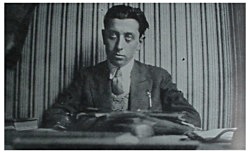
Le Livre secret pour Youki
Ma chérie ma chérie ma Youki
Je n’aime et n’aimerai que toi
Et tu m’aimeras je t’appelle Youki
Reviens ma chérie
Les heures coulent à t’attendre
Je ne pense qu’à toi
Souviens-toi de tes paroles d’espoir Youki
Ne me prépare pas une déception plus
Grande ma chérie
Toi et pas d’autre que toi
Et pas d’autre que moi
N’est-ce pas mon amour
Robert Desnos (1900 – 1945)
– Ma chérie ma chérie ma Youki –
dans Destinée arbitraire
fleursdumal.nl magazine
More in: Archive C-D, Desnos, Robert, Surrealism
Thank you for reading Fleurs du Mal - magazine for art & literature